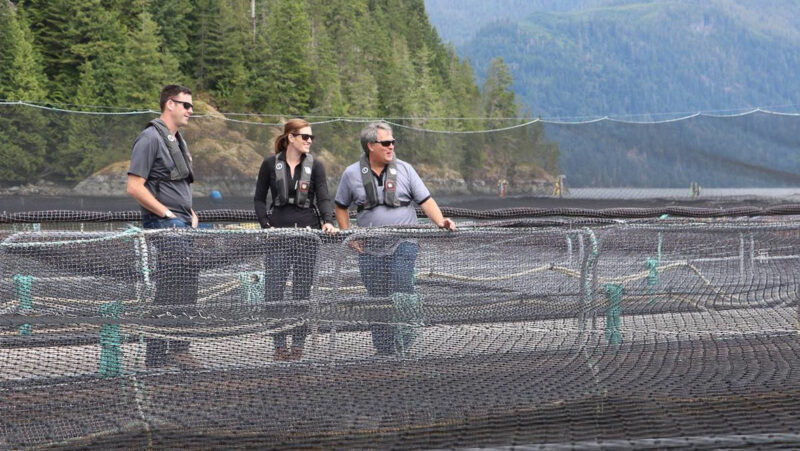Salmon farming in B.C. is more than growing fish
B.C.’s homegrown salmon farming technology is setting the standards around the world, states a new report
By Fabian Dawson
SeaWestNews
The Trudeau Liberals are on a mission to find alternative aquaculture technologies to keep their pre-election pledge to transition away from open-net salmon farming operations in British Columbia.
While the move is not based on science, which has consistently shown that salmon farming in BC pose less than a minimal threat to wild stocks, a new industry report shows that Ottawa does not need to look far for the new and innovative technologies.
The report released by the BC Salmon Farmers Association emphasizes new technologies and innovations being deployed at all stages of the salmon production life cycle – from land-based hatcheries, in-ocean farms to fish processing.
“B.C. is perfectly positioned to lead Canada’s Blue Economy, and we continue to aspire to that. Already, we are a leader in sustainable seafood production through innovation, improvements in environmental stewardship and working hand-in-hand with Indigenous and non-Indigenous communities,” said John Paul Fraser, Executive Director of the BCSFA.
The new report updates features several companies operating in rural B.C. coastal communities developing, piloting, and implementing leading edge responsible technology that the B.C. salmon farming industry has adopted.
“B.C.’s homegrown technology is setting the standard around the world and as technology is piloted and matured in B.C., other salmon producing countries have taken notice and are adopting our expertise and leadership,” he said.
It highlights the B.C. salmon farming industry’s commitment to environmental stewardship, as it continues to transition towards cutting-edge technologies and innovations that focus on understanding and further reducing risk to surrounding ecosystems with wild salmon always being the top priority, said Fraser.
“B.C. is perfectly positioned to lead Canada’s Blue Economy,” said Fraser.
The report update is segmented into eight categories where new technological advancements have occurred in BC’s salmon farming industry:
• Ocean-based containment systems
• Feeding Systems
• Net Cleaning Solutions
• Sea Lice Prevention Innovations
• Sea Lice Treatment Innovations
• Fish Health
• Processing Wastewater
• Clean Energy Adoption
Farmed salmon is B.C.’s top seafood and agri-food export with a total economic output of $1.6 billion. The industry currently supports nearly 6,500 full time jobs that pay 30% higher than higher than B.C.’s median income.
Last December, Federal Fisheries Minister Bernadette Jordan announced the removal of salmon farms in the Discovery Islands’ which will see BC losing almost $390 million in annual economic output with $87 million less in annual salaries and benefits, and 1,535 fewer jobs, mainly in coastal communities of Vancouver Island.
This decision flies in the face of nine-peer reviewed scientific studies that found farmed salmon pose minimal risks to migrating wild stocks in the Discovery Islands – a pre-requisite by the Cohen Commission for the continued operations of the farms in the area.
The fish farmers have applied for a judicial review of the minister’s Dec 17th decision and won an injunction allowing them to continue transferring their salmon into the ocean farms pending a Federal Court ruling on the entire planned phase out. This hearing is scheduled for October.
“The only evidence before me is that today, salmon aquaculture in B.C. poses no more than a minimal risk to wild salmon” said Mr. Justice Panagiotis Pamel, in granting the injunction.
Minister Jordan has consistently sidelined her staff and their scientific recommendations opting for “social licence and acceptability” to benefit the anti-fish farm lobby and its promise of votes from BC’s urban ridings.
A recent poll revealed that the falsehoods about salmon farming, precipitated by well-funded campaigns to destroy BC’s most valuable seafood export, has taken hold in the province.
“Initially, we had believed that the Liberal government of Canada was one which built on the principals of inclusivity and was led by a belief and trust in Canadian-led research and science,” said David Kiemele, Cermaq Canada’s Managing Director, when responding recently to the decisions by Minister Jordan.
He said the positions taken by Minister Jordan are aimed at securing urban Liberal votes, where much of the science-deficit anti-salmon farming sentiments originate from.
“The inability of Minister Jordan to provide an adequate statement as to why she has denied our requests, to us, points to motives outside of science and social license and likely towards securing urban votes as we head into an anticipated late-summer election,” he said.
(Image courtesy of the Campbell River-based Poseidon Ocean Systems, which has developed the world’s most advanced aquaculture steel cage system, which allows for a seamless transition to new salmon farming technologies)

